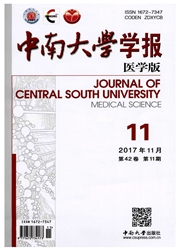

 中文摘要:
中文摘要:
研究重组腺相关性病毒(rAAV)介导的含有Tet-On调控元件的HSV—TK/GCV自杀基因调控治疗系统对人类乳腺癌细胞株MCF-7 DNA损伤的影响及损伤应答的分子机制。方法:彗星实验检测HSV.TK/GCV自杀基因治疗系统对MCF-7 DNA损伤的影响,并对主要的DNA损伤应答的相关活性基因和表达蛋白进行RT-PCR和Western印迹检测,分析其表达变化情况。结果:与各对照组相比,实验组MCF-7细胞的彗星实验结果有明显的彗星拖尾现象,DNA损伤应答的相关活性基因和活性蛋白(如ATM,p53和p27)的表达水平产生了明显的差异,而CyclinE和CDK2的表达水平没有明显变化。结论:HSV-TK/GCV自杀基因治疗系统可以导致MCF-7的DNA损伤反应,这种损伤反应可能是通过一种p53依赖的信号通路引起细胞阻滞导致死亡。
 英文摘要:
英文摘要:
Objective To determine the effect and molecular mechanism of DNA damage caused by suicide gene therapy system HSV-TK/GCV under Tet-On regulation in human breast cancer cell line MCF-7 infected by recombinant adeno-associated virus (rAAV). Methods We used comet assay to detect the effect of HSV-TK/GCV suicide gene regulation system on MCF-7 DNA damage, and analyzed the expression change of relative DNA damage response active genes and proteins with RT-PCR and Western blot. Results Compared with other control groups, the comet assay showed that MCF-7 cells with HSV-TK/GCV treatment had obvious comet tails, and the expression level of DNA damage response active genes and proteins changed obviously in the HSV- TK/GCV treatment group, such as ATM, p53 and p27, but CyclinE and CDK2 did not change Conclusion DNA damage system through a p53-depen on MCF-7 cells is resulted from HSV-TK/GCV in suicide gene therapy dent signal pathway, causing cell cycle arrest and cell death.
 同期刊论文项目
同期刊论文项目
 同项目期刊论文
同项目期刊论文
 The cell death and DNA damages caused by the Tet-On regulating HSV-tk/GCV suicide gene system in MCF
The cell death and DNA damages caused by the Tet-On regulating HSV-tk/GCV suicide gene system in MCF Recombinant AAV-mediated HSVtk gene transfer with direct intratumoral injections and Tet-On regulati
Recombinant AAV-mediated HSVtk gene transfer with direct intratumoral injections and Tet-On regulati 期刊信息
期刊信息
